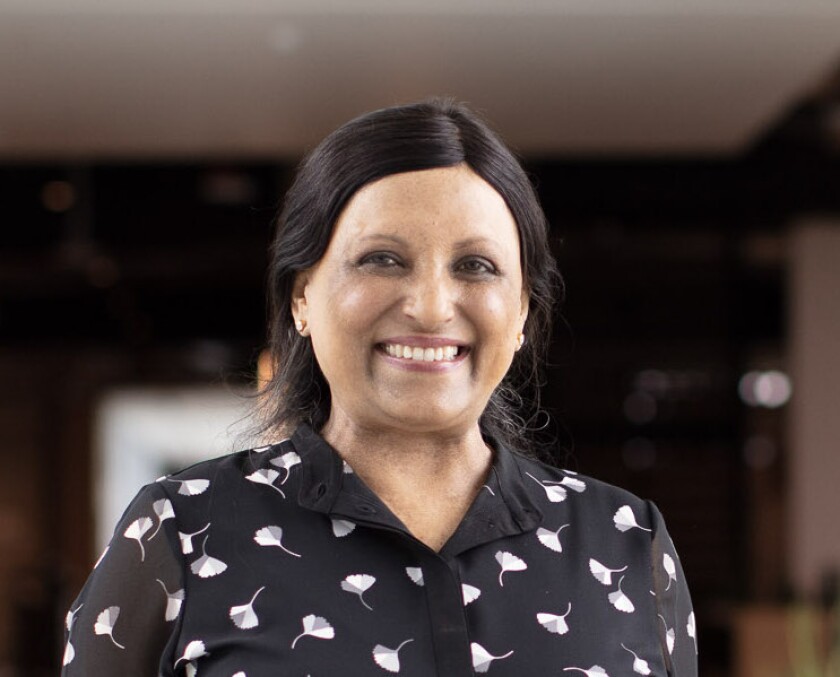Nothing you learn in school prepares you for your first audit. College students spend years learning about the concepts and mechanics of accounting, business and statistics, but you can’t really learn how to be a CPA until you put it into practice — which is why we have to work in the field before we can become a CPA, even if we’ve passed the CPA Exam. In-person training and on-the-job experience are crucial to the success of our youngest accountants.
This year completely changed the accounting profession as we knew it. Offices closed, businesses shuttered and CPAs all over the country turned their homes into home offices. In a profession so reliant on in-person interaction, we've found ways to readjust, but not without consequences. As firms begin preparing this month for the busy season, we need to look back at what we've learned about hiring, training and working in a pandemic so we can prepare for the new normal.
Rathi Murthy is the Chief Technology Officer at Varo Bank, the first nationally chartered all-digital consumer bank in the United States. In this role, she leads the company's end-to-end technology strategy, overseeing the design and development of secure, scalable, and AI-powered digital banking platforms. Her leadership is instrumental in advancing Varo's mission to build inclusive, accessible, and real-time financial solutions for millions of consumers.
A seasoned technology executive, Rathi brings over 25 years of experience leading innovation and digital transformation at some of the world's most recognized technology and financial services companies. Prior to joining Varo, she served as Chief Technology Officer and President of Expedia Product & Technology at Expedia Group, where she modernized the company's global travel infrastructure, integrating AI-driven personalization, modular architecture, and advanced cloud capabilities across its family of brands.
Earlier, she held executive leadership roles at Verizon Media and Gap Inc., where she led enterprise cloud migrations, e-commerce platform evolution, and large-scale product delivery initiatives across global markets.
Rathi also served as Senior Vice President and Chief Information Officer of Enterprise Growth at American Express, where she was responsible for the technology strategy and operations of the Serve platform and a suite of prepaid products including Bluebird.
Rathi's early career includes engineering leadership roles at eBay, Yahoo!, Sun Microsystems, and WebMD, where she consistently delivered improvements in platform stability, operational agility, and customer experience.
In addition to her executive work, Murthy is a board member at PagerDuty, Inc., a leader in digital operations management, and serves as an External Expert Advisor to the University of San Francisco's Board of Trustees Committee on Information Technology Strategy. She is also a regular speaker at industry events and leadership forums, offering thought leadership on topics such as fintech innovation, integrating AI, platform transformation, and executive technology leadership.
Guy Baker, CFP, Ph.D., is the founder of Wealth Teams Alliance in Irvine, California.
He is a member of the Forbes 250 Top Financial Security Professionals list and is author of "Maximize the RedZone," a guide for business owners, as well as "The Great Wealth Erosion," "Manage Markets, Not Stocks" and "Investment Alchemy." He received the 2019 John Newton Russell Memorial Award for lifetime achievement in insurance.
The pandemic has exacerbated fraud and we’ll face mounting pressure to identify financial fraud next year. We’ve already seen major cases, such as this year’s Wirecard and Luckin Coffee scandals, that will only continue to be exposed during a time of economic instability. There was already a learning curve associated with the lack of training at an education level involved with identifying and ferreting out fraud. This will only continue as new CPAs get less hands-on training.
In the immediate aftermath of the pandemic, companies slashed their budgets for consulting and advisory work. As a result, accounting and consulting firms have had to do damage control. Business Insider reports that KPMG laid off parts of its tax, audit and advisory staff, Accenture cut 5 percent of its workforce, and PwC paused all fall recruitment efforts.
Most layoffs skew toward junior or administrative employees, which has led senior auditors to take on more work and different kinds of work. This change in staffing has influenced the day-to-day work of more experienced employees in two ways. On one hand, they no longer have large teams with junior members to take on administrative tasks, bogging down employees in the grunt work. On the other hand, they no longer have to train these younger employees, opening up more time to do client work.
Training takes up a lot of time, but it's a crucial part of the workforce ecosystem. As entire offices went remote and companies trimmed their teams, we began missing out on in-office communication and in-person training, which can have long-term effects on our profession. It's easy to not feel the brunt of it at first; in fact, productivity and efficiency have gone up in the short term. However, we'll start to see a larger learning gap between new hires and more experienced accountants in the long term.
Another side effect of these layoffs is that the market for experienced CPAs is much more competitive. As businesses struggle with unpredictable cash flows, inefficiencies and new government policies and financial aid packages, the demand for seasoned financial talent has increased, and companies are fighting to hold onto their best performers who can work autonomously from home.
It's great to see so many adapting to the work-from-home environment, and cuts or delayed hiring may have been necessary for the profession to manage through the first wave of the pandemic. But as we enter phase two, we need to prepare for what 2021 and beyond will look like in this "new normal."
There's a big challenge we face with new-hire training, and it will be hard for new hires to be as effective if they can't work alongside their teams and learn in-person. Firms might be inclined to skip out on or limit hiring new talent this November. You could see demand for experienced hires go up because seasoned professionals can work more autonomously, while demand for new hires decreases as firms realize they are at a disadvantage in trying to train new employees effectively, even with the technology and collaboration tools that are available.
When COVID-19 changed the way we worked overnight, technology adoption was no longer a nice-to-have but a necessity. Gone were the days of relying on manual processes and side-by-side training, and the firms that were already technologically savvy have shined the most during this dark time. That's not to say technology can or will solve all our problems.
The firms that double down on a hybrid model of training — half remote and half in-person, following government guidelines — will be the most successful in this new normal. The virus will not magically disappear in the new year, so we need to further advance technology adoption that enhances CPA capabilities, such as utilizing remote learning and training capabilities, and shift from confirmation procedures that rely on mail or fax to electronic confirmations, which more effectively fit into the new normal of working from home.
We will need to get back to team-based in-person work and training at the client’s location, however. These last few months have proven that we might not have to do it as often as before the pandemic. But the future of CPA talent relies on side-by-side training and mentoring, especially if we expect new hires to get up to speed as quickly as they have in the past.
Nothing students learn in school will fully prepare them for their first audit — never mind finding fraud. We need to hire these young professionals and usher our firms into the "new normal," a world reliant on technology, combining in-person and online processes, and dedicated to the education and training of our youngest CPAs.







